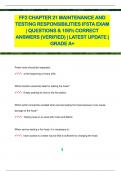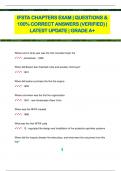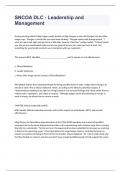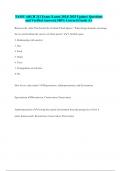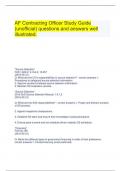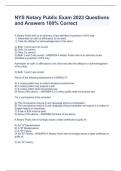Running head: Examining The Effects Of Expatriate Or Local In The Relationship Between
Emotional Regulation And Friendship Quality
Examining The Effects Of Expatriate Or Local
In The Relationship Between Emotional Regulation
And Friendship Quality
Research Method II
Cedric Badjeck
Group 8 Int
Vrije Universiteit Amsterdam
28-05-2023
,Examining The Effects Of Expatriate Or Local In The Relationship Between Emotional
Regulation And Friendship Quality
Abstract
This study aimed to investigate the moderating role of being an expatriate or local in
the relationship between emotional regulation and the quality of friendships. Using a sample
of 77 participants, the study tested the hypothesis that the impact of emotional regulation on
the quality of friendships would differ depending on the expatriate or local status of the
individual. However, the results showed no significant moderation or main effects of
emotional regulation and expatriates or locals on the quality of friendships. These findings
suggest that emotional regulation may play a consistent role in the quality of friendships
regardless of one's status as an expatriate or local.
Introduction
Crossing borders and relocating to new countries for work, education or personal reasons has
become more common in today's globalized world. For expatriates, moving to a new country
can be an exciting, life-changing experience, but it can also present challenges such as
communication barriers, feelings of isolation, and cultural disorientation. One way to deal
with these difficulties is to build friendships with locals (Vijayakumar & Cunningham, 2016).
According to the culture learning model, befriending locals could provide numerous benefits
for expatriates in their cultural adaptation process. Firstly, it allows expatriates to gain insight
into the local culture, customs, and values, which are necessary for building effective
communication and developing social competence. Additionally, friendships with locals can
help reduce culture shock and ease the adjustment process (Zhou et al., 2018). The stress and
coping model posits that building friendships is essential for dealing with stresses associated
with living abroad (Webb et al., 2012).
Certain psychological factors, such as emotional regulation, could play an important
role in shaping and maintaining good friendships (Rubin et al., 2011). Emotional regulation
, Examining The Effects Of Expatriate Or Local In The Relationship Between Emotional
Regulation And Friendship Quality
refers to an individual's ability to manage and control their emotions, behaviours, and
thoughts in response to a given situation (Gross & John, 2003). There are two types of
emotional regulation. The first type is cognitive reappraisal which is a strategy that involves
changing the way we think about a situation to alter our emotional response to it; for example,
rationalizing a friends’ lateness by finding possible reasons for it. This helps decrease
frustration and avoid conflict. The second type is suppression, it refers to hiding one’s
experienced emotional reaction, which can lead to negative consequences like strain on
relationships. Individuals with good emotional regulation skills are better equipped at
handling conflicts and disagreements, which are crucial in maintaining close relationships.
They are more likely to respond to emotional cues from others in a socially appropriate way,
which helps maintain positive connections with friends, even during challenging times
(Eisenberg et al., 2010). Whereas individuals who struggle with emotional regulation are
more likely to experience stress, anxiety, and depression, all of which can negatively affect
their relationships (Troy et al., 2010).
Several studies have investigated different mediators that could influence the
relationship between emotional regulation and quality of friendships. Gardner et al. (2009)
found that emotional regulation was positively related to friendship quality and that this
relationship was partially mediated by the quality of communication in the friendships.
Another study found that empathy partially mediated the relationship between emotional
regulation and friendship quality in a sample of children (Rieffe, et al., 2008). It was also
Emotional Regulation And Friendship Quality
Examining The Effects Of Expatriate Or Local
In The Relationship Between Emotional Regulation
And Friendship Quality
Research Method II
Cedric Badjeck
Group 8 Int
Vrije Universiteit Amsterdam
28-05-2023
,Examining The Effects Of Expatriate Or Local In The Relationship Between Emotional
Regulation And Friendship Quality
Abstract
This study aimed to investigate the moderating role of being an expatriate or local in
the relationship between emotional regulation and the quality of friendships. Using a sample
of 77 participants, the study tested the hypothesis that the impact of emotional regulation on
the quality of friendships would differ depending on the expatriate or local status of the
individual. However, the results showed no significant moderation or main effects of
emotional regulation and expatriates or locals on the quality of friendships. These findings
suggest that emotional regulation may play a consistent role in the quality of friendships
regardless of one's status as an expatriate or local.
Introduction
Crossing borders and relocating to new countries for work, education or personal reasons has
become more common in today's globalized world. For expatriates, moving to a new country
can be an exciting, life-changing experience, but it can also present challenges such as
communication barriers, feelings of isolation, and cultural disorientation. One way to deal
with these difficulties is to build friendships with locals (Vijayakumar & Cunningham, 2016).
According to the culture learning model, befriending locals could provide numerous benefits
for expatriates in their cultural adaptation process. Firstly, it allows expatriates to gain insight
into the local culture, customs, and values, which are necessary for building effective
communication and developing social competence. Additionally, friendships with locals can
help reduce culture shock and ease the adjustment process (Zhou et al., 2018). The stress and
coping model posits that building friendships is essential for dealing with stresses associated
with living abroad (Webb et al., 2012).
Certain psychological factors, such as emotional regulation, could play an important
role in shaping and maintaining good friendships (Rubin et al., 2011). Emotional regulation
, Examining The Effects Of Expatriate Or Local In The Relationship Between Emotional
Regulation And Friendship Quality
refers to an individual's ability to manage and control their emotions, behaviours, and
thoughts in response to a given situation (Gross & John, 2003). There are two types of
emotional regulation. The first type is cognitive reappraisal which is a strategy that involves
changing the way we think about a situation to alter our emotional response to it; for example,
rationalizing a friends’ lateness by finding possible reasons for it. This helps decrease
frustration and avoid conflict. The second type is suppression, it refers to hiding one’s
experienced emotional reaction, which can lead to negative consequences like strain on
relationships. Individuals with good emotional regulation skills are better equipped at
handling conflicts and disagreements, which are crucial in maintaining close relationships.
They are more likely to respond to emotional cues from others in a socially appropriate way,
which helps maintain positive connections with friends, even during challenging times
(Eisenberg et al., 2010). Whereas individuals who struggle with emotional regulation are
more likely to experience stress, anxiety, and depression, all of which can negatively affect
their relationships (Troy et al., 2010).
Several studies have investigated different mediators that could influence the
relationship between emotional regulation and quality of friendships. Gardner et al. (2009)
found that emotional regulation was positively related to friendship quality and that this
relationship was partially mediated by the quality of communication in the friendships.
Another study found that empathy partially mediated the relationship between emotional
regulation and friendship quality in a sample of children (Rieffe, et al., 2008). It was also


